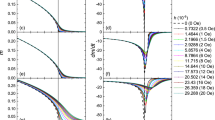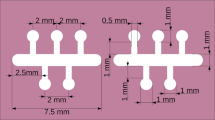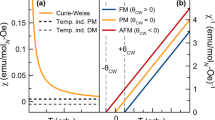Abstract
IN a recent paper,1 Gerlach and Schneiderhan have described some experiments on the electrical resistance of nickel as a function of the temperature and as a function of a longitudinal external magnetic field. They have shown that in the absence of an external magnetic field there is, in addition to the normal linear change of resistance with temperature, a term which is directly proportional to the energy of spontaneous magnetisation. The accuracy with which this relation holds good for all temperatures up to the Curie point is very striking.
This is a preview of subscription content, access via your institution
Access options
Subscribe to this journal
Receive 51 print issues and online access
$199.00 per year
only $3.90 per issue
Buy this article
- Purchase on Springer Link
- Instant access to full article PDF
Prices may be subject to local taxes which are calculated during checkout
Similar content being viewed by others
References
Ann. d. Phys., 5, 6, p. 772.
Weiss and Forrer, Annales de Phys., 10, 5, p. 153.
Author information
Authors and Affiliations
Rights and permissions
About this article
Cite this article
POTTER, H. Relation between Electrical Resistance and Energy of Magnetisation. Nature 127, 555–556 (1931). https://doi.org/10.1038/127555b0
Issue Date:
DOI: https://doi.org/10.1038/127555b0
This article is cited by
Comments
By submitting a comment you agree to abide by our Terms and Community Guidelines. If you find something abusive or that does not comply with our terms or guidelines please flag it as inappropriate.



